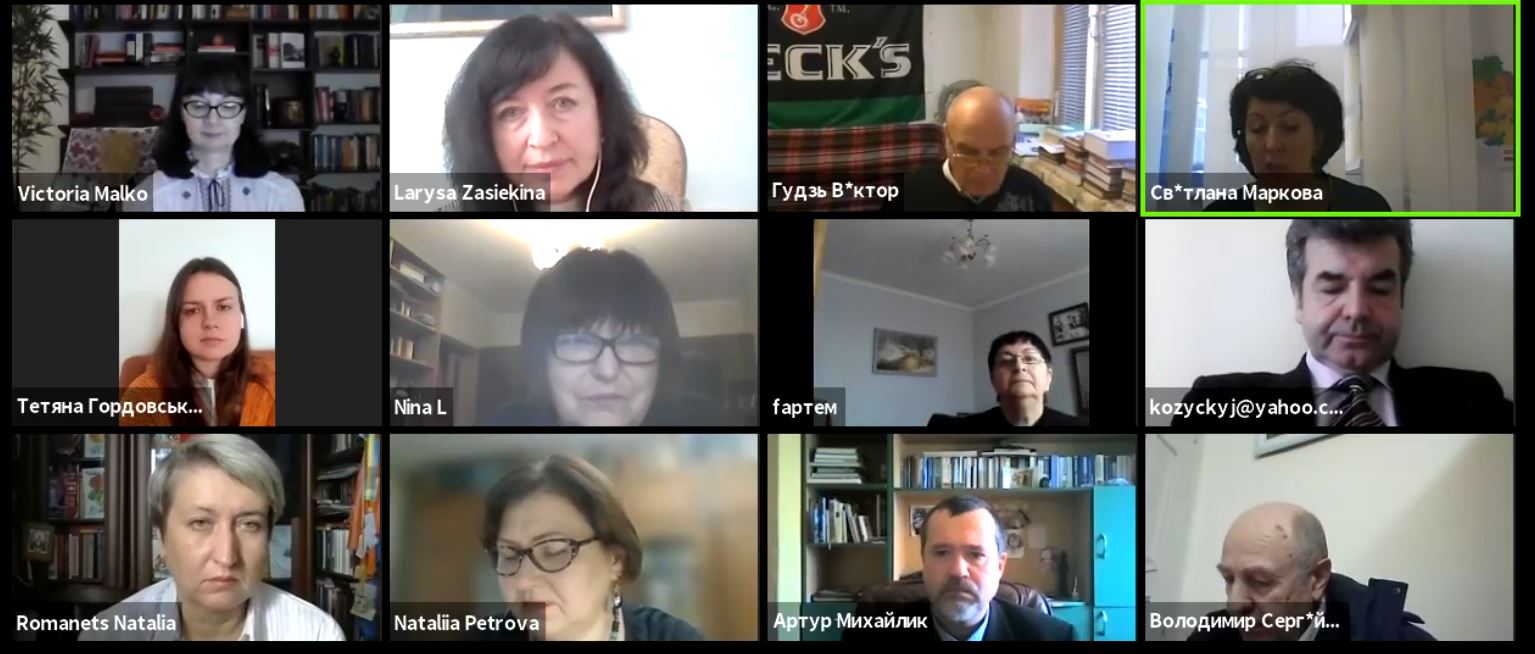International Scientific and Practical Conference “Interdisciplinary Approaches in the Study of the Holodomor Genocide” held in Kyiv
On November 25, 2021, the Holodomor Research Institute hosted the V International Scientific and Practical Conference “Interdisciplinary Approaches in the Study of the Holodomor genocide.”The event took place in the online format.
Olesia Stasiuk, Director General of the National Museum of the Holodomor Genocide, Candidate of Historical Sciences, addressed the participants with a welcoming speech.
The work of the conference covered the following areas:
- interdisciplinary approaches in the research of the Holodomor-Genocide;
- causes and consequences of the Holodomor-Genocide in Ukraine;
- socio-economic, socio-political, demographic, moral, and psychological consequences of the Holodomor-Genocide;
- Ukrainians’ resistance to genocidal and repressive actions of the communist totalitarian regime;
- the memory of the Holodomor-Genocide in Ukraine: features of formation, scientific researches, instrumentalization in politics;
- convergence of research results on the Holodomor-Genocide of scholars in the field of history, political science, law, medicine, statistics, sociology, criminology, pedagogy, anthropology, historical demography, social psychology, historical geography.
The conference was attended by 40 participants – historians, lawyers, museologists, specialists in other scientific fields.
In particular, Volodymyr Serhiichuk, Doctor of History, Professor, Head of the Department of World Ukrainian History, Taras Shevchenko National University of Kyiv, Leading Researcher of the Socio-Demographic and Legal Aspects of the Holodomor Research Institute of the Holodomor-Genocide Museum told about the results of his research on the analysis of infant mortality in 1932-1933. The scholar also made a report on the change in consciousness of the consequences of the Holodomor-Genocide by the Ukrainian diaspora.
In turn, Larysa Zasekina, Doctor of Psychology, Professor, Vice-Rector for Research, Teaching and International Cooperation of Lesia Ukrainka Volyn National University, drew attention to the psychological consequences of the Holodomor.
The conference was also attended by:
Svitlana Markova, Doctor of Historical Sciences, Associate Professor, Director of the Holodomor Research Institute of the National Museum of the Holodomor-Genocide, PhD student of Zaporizhzhia National University;
Inna Shuhaliova, Candidate of Historical Sciences, Associate Professor, Leading Research Fellow of the Holodomor-Genocide Research Department of the Holodomor Research Institute of the National Museum of the Holodomor-Genocide, PhD student of Zaporizhzhia National University;
Dmytro Bilyi, Doctor of Historical Sciences, Professor, Head of the Department of Historical Studies of the Holodomor-Genocide of the Holodomor Research Institute of the National Museum of the Holodomor-Genocide;
Ivan Petrenko, Candidate of Historical Sciences, Deputy Director of the Holodomor Research Institute of the National Museum of the Holodomor-Genocide;
Andrii Ivanets, Candidate of Historical Sciences, Senior Research Fellow at the Holodomor Research Institute of the National Museum of the Holodomor-Genocide, PhD student at Zaporizhzhia National University;
Victor Hudz, Doctor of Historical Sciences, Associate Professor of History and Archeology, Bohdan Khmelnytsky Melitopol State Pedagogical University, told about the falsifications associated with the Holodomor in the researchings of Russian historians and publicists;
Roman Tesliuk, Candidate of Geographical Sciences, Senior Research Fellow at the Department of Socio-Demographic and Legal Aspects of the Holodomor-Genocide of the Holodomor Research Institute of the National Museum of the Holodomor-Genocide, presented a report on theoretical and methodological differences between various estimates of the demographic losses due to the Holodomor-Genocide of 1932-1933;
Anatolii Filiniuk, Doctor of Historical Sciences, Professor, Head of the Department of History of Ukraine, Kamyanets-Podilsky Ivan Ohienko National University;
Nataliia Petrova, Candidate of Historical Sciences, I.I.Mechnikov ONU, Deputy Dean for Research, Associate Professor of Archeology and Ethnology of Ukraine shared her experience on the formation of the Holodomor memory policy in her region;
Mykola Herasymenko, Honored Lawyer of Ukraine, Lieutenant General of the Security Service of Ukraine, spoke about the legal aspects of the study of the Holodomor-Genocide;
Oleh Pohorilets, director of the Medzhybizh State Historical and Cultural Reserve, told about ways to present the memory of the Holodomor of 1932-1933 in the museum space using the exposition of the Medzhybizh State Historical and Cultural Reserve as an example.
Oleksander Nikiliev, Doctor of Historical Sciences, Professor of Oles Honchar Dnipro National University, addressed the problem of socio-demographic consequences of the Holodomor, particularly in the Dnipro region.
